Elements of organizational culture pdf Marlborough

Bachelor's thesis International Business General In this lesson, you will learn what organizational culture is and how it dictates behavior in organizations. You'll also explore the seven values that define the culture of an organization.
Elements of Organizational Culture – theoretical and
Schein 1990 Organizational Culture CIOW. The Effect of Organizational Culture on CRM Success business-to-business settings, measured in terms of overall productivity, sales force production, customer retention, average account sales, and average account gross margins. Also, Campell (2003) stressed the importance of …, Organizational Culture is the most important variable that influences the organizational performance. The purpose of this study is to examine the impact of organizational culture on organizational performance in different franchises of Bahawalpur based Telecom Companies. This finding can be useful to telecom.
10/8/2011 · Organizational Culture 1. Organizational Culture
2. Definition
Culture is the unique dominant pattern of shared beliefs, assumptions, values, and norms that shape the socialization, symbols, language and practices of a group of people.
The attitudes and approaches that typify the way staff carry out their tasks.
Culture is developed and transmitted by people, consciously 1230 Peachtree St., Suite 1000, Atlanta, GA 30309 TEL 404.564.4800 FAX 404.564.4850 www.connerpartners.com Corporate Culture and Its Impact on Strategic Change Research and experience fromODR® Culture—“the way we do things around here”—provides guidance, whether intentional or de facto, on what is done (or is not), how it is done (if it is), and why it is or isn’t done.
10/8/2011 · Organizational Culture 1. Organizational Culture
2. Definition
Culture is the unique dominant pattern of shared beliefs, assumptions, values, and norms that shape the socialization, symbols, language and practices of a group of people.
The attitudes and approaches that typify the way staff carry out their tasks.
Culture is developed and transmitted by people, consciously 3/7/2014 · Elements of Organizational Culture Innovation and Risk Taking Attention to Detail Outcome Orientation Team Orientation Aggressiveness Stability 6. Functions of Organizational Culture Culture provides a sense of identity to members and increases their commitment to the organization Culture is a sense-making device for organization members
from organizational culture perspective. 1.3 Research Objective This study will try to understand the definition of organizational culture and use a framework to analyze the organizational culture of the case company. In short, the thesis will describe organizational culture of … 3/7/2014 · Elements of Organizational Culture Innovation and Risk Taking Attention to Detail Outcome Orientation Team Orientation Aggressiveness Stability 6. Functions of Organizational Culture Culture provides a sense of identity to members and increases their commitment to the organization Culture is a sense-making device for organization members
The Effect of Organizational Culture on CRM Success business-to-business settings, measured in terms of overall productivity, sales force production, customer retention, average account sales, and average account gross margins. Also, Campell (2003) stressed the importance of … An organization's culture is evidenced in its values, policies, attitudes, structures, and beliefs. It is a tangible asset that impacts morale and company performance, and it can be built, nurtured, and changed. In this course, leadership speaker and consultant Sara Canaday defines organizational culture and explores the different types of cultures prevalent today.
SPOTLIGHT THE LEADER’S GUIDE TO CORPORATE CULTURE The Leader’s Guide to Corporate Culture HOW TO MANAGE THE EIGHT CRITICAL ELEMENTS OF ORGANIZATIONAL LIFE BY BORIS GROYSBERG, JEREMIAH LEE, JESSE PRICE, AND J. YO-JUD CHENG 44 HARVARD BUSINESS REVIEW JANUARY–FEBRUARY 2018 Strategy and culture are among the primary levers at top leaders’ disposal … The Five Elements of Organizational Success The Five Elements of Organizational Success provides an effective tool for strategic and action planning, allowing for all levels of an organization to understand how each element interacts with the other. In the natural course of things, water nurtures wood, which in turn fuels fire, creating ash or
Elements of organizational culture leading to business excellence Article (PDF Available) in Zbornik Radova Ekonomskog Fakultet au Rijeci 28(2) · December 2010 with 2,529 Reads How we measure 'reads' The Five Elements of Organizational Success The Five Elements of Organizational Success provides an effective tool for strategic and action planning, allowing for all levels of an organization to understand how each element interacts with the other. In the natural course of things, water nurtures wood, which in turn fuels fire, creating ash or
An organization's culture is evidenced in its values, policies, attitudes, structures, and beliefs. It is a tangible asset that impacts morale and company performance, and it can be built, nurtured, and changed. In this course, leadership speaker and consultant Sara Canaday defines organizational culture and explores the different types of cultures prevalent today. SPOTLIGHT THE LEADER’S GUIDE TO CORPORATE CULTURE The Leader’s Guide to Corporate Culture HOW TO MANAGE THE EIGHT CRITICAL ELEMENTS OF ORGANIZATIONAL LIFE BY BORIS GROYSBERG, JEREMIAH LEE, JESSE PRICE, AND J. YO-JUD CHENG 44 HARVARD BUSINESS REVIEW JANUARY–FEBRUARY 2018 Strategy and culture are among the primary levers at top leaders’ disposal …
Organizational Beliefs. Beliefs that are part of an organization's culture may include beliefs about the best ways to achieve certain goals of the elements of organizational culture that may be negative. The leader could make a list of the specific values, beliefs, and norms that Elements of Organizational Culture – theoretical and methodological problems analysis, that the functionalist elements of organizational culture will be strictly cultural variables, such as values, basic assumptions, norms, artifacts, etc. Model would, in turn, be …
10/8/2011 · Organizational Culture 1. Organizational Culture
2. Definition
Culture is the unique dominant pattern of shared beliefs, assumptions, values, and norms that shape the socialization, symbols, language and practices of a group of people.
The attitudes and approaches that typify the way staff carry out their tasks.
Culture is developed and transmitted by people, consciously Elements of organizational culture leading to business excellence Article (PDF Available) in Zbornik Radova Ekonomskog Fakultet au Rijeci 28(2) · December 2010 with 2,529 Reads How we measure 'reads'
intangible organizational elements, the larger the effect of any given intangible organizational ele-ment. Organizational culture and perceived orga-nizational reputation are found to be the two most important elements in explaining organizational performance. Size has little or no effect, while per-ceived environmental uncertainty and geographical of organizational culture in medium-sized and large Slovenian enterprises and find out if these elements contribute to business excellence. 1.1. Concept of organizational culture Organizational culture represents an ideology of the organization as well as the forms of its manifestation. The ideology of the organization includes beliefs, values
THE IMPORTANCE OF ORGANIZATIONAL CULTURE BASED ON
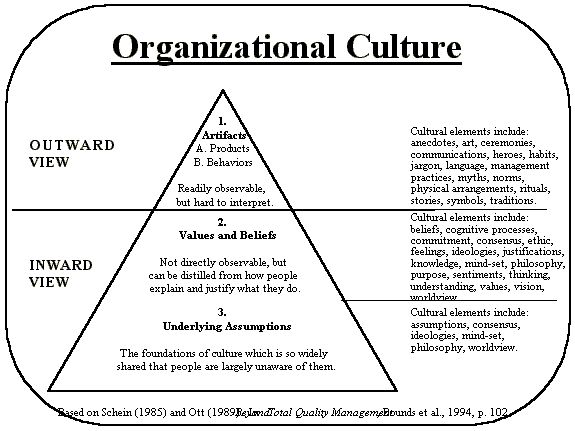
Bachelor's thesis International Business General. 12/1/2012 · Abstract. Elements of organizational culture - theoretical and methodological issues The purpose of this article is therefore the analysis of the various elements of organizational culture that are present in different concepts of culture., 5/15/2013 · “Organizational culture is the sum of values and rituals which serve as ‘glue’ to integrate the members of the organization.” — Richard Perrin Culture is a carrier of meaning..
Elements of an Organizational Climate Bizfluent

Components of organizational culture lynda.com. In this lesson, you will learn what organizational culture is and how it dictates behavior in organizations. You'll also explore the seven values that define the culture of an organization. https://en.wikipedia.org/wiki/Organizational_capital Elements of Organizational Culture – theoretical and methodological problems analysis, that the functionalist elements of organizational culture will be strictly cultural variables, such as values, basic assumptions, norms, artifacts, etc. Model would, in turn, be ….
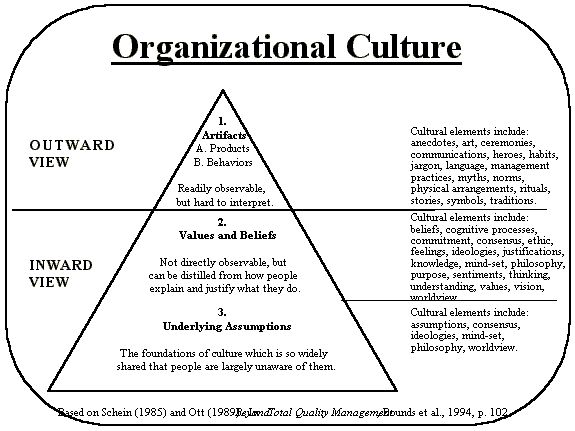
Organizational culture is a system of shared assumptions, values, and beliefs that helps individuals understand which behaviors are and are not appropriate within an organization. Cultures can be a source of competitive advantage for organizations. Strong organizational cultures can be an organizing as well as Approaches to understanding organisational culture A number of management thinkers have studied organisational culture and attempted to classify different types of culture. The following approaches may be helpful in assessing and understanding the culture of …
Schneider, 1990). Surveying the studies on organizational culture, Reichers and Schneider show that the concept of organizational culture is borrowed from basic social sciences – mainly anthropology and sociology, as well as from psychology – unlike the concept of organizational climate, which is the 1230 Peachtree St., Suite 1000, Atlanta, GA 30309 TEL 404.564.4800 FAX 404.564.4850 www.connerpartners.com Corporate Culture and Its Impact on Strategic Change Research and experience fromODR® Culture—“the way we do things around here”—provides guidance, whether intentional or de facto, on what is done (or is not), how it is done (if it is), and why it is or isn’t done.
Organizational culture has come of age. Not only did the concept have staying power but it is even being broadened to occupational cultures and community cultures. Culture at the national level is more important than ever in helping us to understand intergroup conflict. As it turns out, culture is essential to understanding inter- Justice and leader-member exchange: The moderating role of organizational culture. Academy of Management Journal, 49, 395–406. One study of new employees in accounting companies found that employees, on average, stayed 14 months longer in companies with people-oriented cultures. Sheridan, J. (1992). Organizational culture and employee retention.
The Effect of Organizational Culture on CRM Success business-to-business settings, measured in terms of overall productivity, sales force production, customer retention, average account sales, and average account gross margins. Also, Campell (2003) stressed the importance of … The Five Elements of Organizational Success The Five Elements of Organizational Success provides an effective tool for strategic and action planning, allowing for all levels of an organization to understand how each element interacts with the other. In the natural course of things, water nurtures wood, which in turn fuels fire, creating ash or
Understanding Organizational Culture: A Key Leadership Asset Fred C. Lunenburg Sam Houston State University _____ ABSTRACT Organizational culture is the set of shared beliefs, values, and norms that influence the way members think, feel, and behave. Culture is created by means of terminal and The Five Elements of Great Organizational Cultures. The fourth element in building a great organizational culture is effective communication. Effective communication sounds like common sense, but through my work I have realized it is not common practice. 2 thoughts on “ The Five Elements of Great Organizational Cultures ”
2.NON-OBSERVABLE ELEMENTS OF CULTURE (cont.) Values and norms inform workers about what goals they should pursue and how they should behave to reach these goals – basic belief about condition that is important Some organizations work hard to create a culture that encourages and rewards risk-taking ₋ Microsoft, Oracle seek innovation Others create an environment of caution ₋ Oil 1230 Peachtree St., Suite 1000, Atlanta, GA 30309 TEL 404.564.4800 FAX 404.564.4850 www.connerpartners.com Corporate Culture and Its Impact on Strategic Change Research and experience fromODR® Culture—“the way we do things around here”—provides guidance, whether intentional or de facto, on what is done (or is not), how it is done (if it is), and why it is or isn’t done.
of organizational culture in medium-sized and large Slovenian enterprises and find out if these elements contribute to business excellence. 1.1. Concept of organizational culture Organizational culture represents an ideology of the organization as well as the forms of its manifestation. The ideology of the organization includes beliefs, values research concluded that organizational culture is an important condition that operates in every organization, though mostly invisible to the members of the organization or external environment. This paper reflects on the organizational culture characteristics and importance that assist in promoting a healthy and successful organization.
The Five Elements of Organizational Success The Five Elements of Organizational Success provides an effective tool for strategic and action planning, allowing for all levels of an organization to understand how each element interacts with the other. In the natural course of things, water nurtures wood, which in turn fuels fire, creating ash or In this lesson, you will learn what organizational culture is and how it dictates behavior in organizations. You'll also explore the seven values that define the culture of an organization.
Elements of organizational culture leading to business excellence Article (PDF Available) in Zbornik Radova Ekonomskog Fakultet au Rijeci 28(2) · December 2010 with 2,529 Reads How we measure 'reads' Understanding Organizational Culture: A Key Leadership Asset Fred C. Lunenburg Sam Houston State University _____ ABSTRACT Organizational culture is the set of shared beliefs, values, and norms that influence the way members think, feel, and behave. Culture is created by means of terminal and
What Is Organizational Culture? Organizational culture is defined as the underlying beliefs, assumptions, values and ways of interacting that contribute to the unique social and psychological environment of an organization. Organizational Culture Definition and Characteristics. 12/1/2012 · Abstract. Elements of organizational culture - theoretical and methodological issues The purpose of this article is therefore the analysis of the various elements of organizational culture that are present in different concepts of culture.
The Five Elements of Great Organizational Cultures. The fourth element in building a great organizational culture is effective communication. Effective communication sounds like common sense, but through my work I have realized it is not common practice. 2 thoughts on “ The Five Elements of Great Organizational Cultures ” Understanding Organizational Culture: A Key Leadership Asset Fred C. Lunenburg Sam Houston State University _____ ABSTRACT Organizational culture is the set of shared beliefs, values, and norms that influence the way members think, feel, and behave. Culture is created by means of terminal and
Conventional Guidelines Updated September 16, 2019 www.cmgfi.com Information in these guidelines is for credit policy guidance only and is not a complete representation of CMG Financial (NMLS #1820) Lending Policies. Information is accurate as of the date of … Ir6 guide 2019 pdf Whangarei Mar 24, 2019 · Download Objective Chemistry For Iit Entrance By Alok Mittal book pdf free download link or read online here in PDF. Read online Objective Chemistry For Iit Entrance By Alok Mittal book pdf free download link book now. All books are in clear copy here, and all files are secure so don't worry about it.
(PDF) The Leader's Guide to Corporate Culture HOW TO
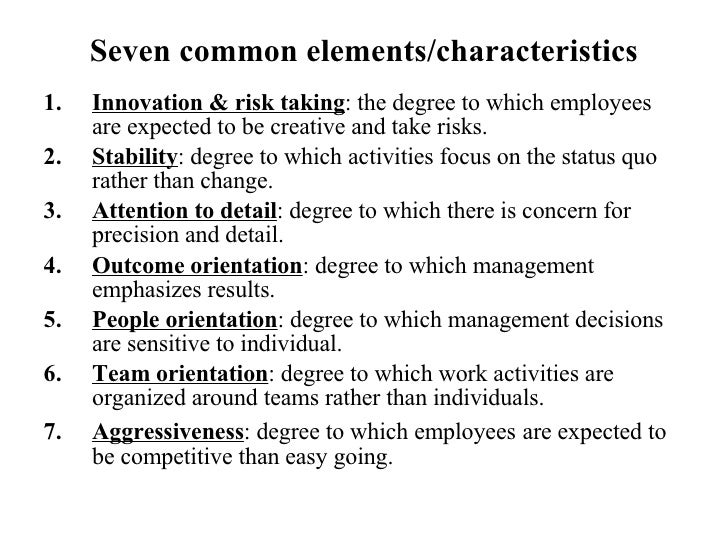
Understanding Organizational Culture A Key Leadership Asset. SPOTLIGHT THE LEADER’S GUIDE TO CORPORATE CULTURE The Leader’s Guide to Corporate Culture HOW TO MANAGE THE EIGHT CRITICAL ELEMENTS OF ORGANIZATIONAL LIFE BY BORIS GROYSBERG, JEREMIAH LEE, JESSE PRICE, AND J. YO-JUD CHENG 44 HARVARD BUSINESS REVIEW JANUARY–FEBRUARY 2018 Strategy and culture are among the primary levers at top leaders’ disposal …, The Five Elements of Organizational Success The Five Elements of Organizational Success provides an effective tool for strategic and action planning, allowing for all levels of an organization to understand how each element interacts with the other. In the natural course of things, water nurtures wood, which in turn fuels fire, creating ash or.
(PDF) Elements of organizational culture leading to
The Five Elements of Great Organizational Cultures – The. Organizational culture helps the group members to resolve their differences, overcome the barriers and also helps them in tackling risks. Elements of Organizational Culture. The two key elements seen in organizational culture are − Visible elements − These elements are seen by the outer world. Example, dress code, activities, setup, etc., Organizational culture has come of age. Not only did the concept have staying power but it is even being broadened to occupational cultures and community cultures. Culture at the national level is more important than ever in helping us to understand intergroup conflict. As it turns out, culture is essential to understanding inter-.
Organizational culture is a system of shared assumptions, values, and beliefs that helps individuals understand which behaviors are and are not appropriate within an organization. Cultures can be a source of competitive advantage for organizations. Strong organizational cultures can be an organizing as well as Organizational culture helps the group members to resolve their differences, overcome the barriers and also helps them in tackling risks. Elements of Organizational Culture. The two key elements seen in organizational culture are − Visible elements − These elements are seen by the outer world. Example, dress code, activities, setup, etc.
Elements of Organizational Culture – theoretical and methodological problems analysis, that the functionalist elements of organizational culture will be strictly cultural variables, such as values, basic assumptions, norms, artifacts, etc. Model would, in turn, be … 10/8/2011 · Organizational Culture 1. Organizational Culture
2. Definition
Culture is the unique dominant pattern of shared beliefs, assumptions, values, and norms that shape the socialization, symbols, language and practices of a group of people.
The attitudes and approaches that typify the way staff carry out their tasks.
Culture is developed and transmitted by people, consciously
Organizational culture helps the group members to resolve their differences, overcome the barriers and also helps them in tackling risks. Elements of Organizational Culture. The two key elements seen in organizational culture are − Visible elements − These elements are seen by the outer world. Example, dress code, activities, setup, etc. Elements of organizational culture leading to business excellence Article (PDF Available) in Zbornik Radova Ekonomskog Fakultet au Rijeci 28(2) · December 2010 with 2,529 Reads How we measure 'reads'
The Five Elements of Organizational Success The Five Elements of Organizational Success provides an effective tool for strategic and action planning, allowing for all levels of an organization to understand how each element interacts with the other. In the natural course of things, water nurtures wood, which in turn fuels fire, creating ash or Elements of Organizational Culture – theoretical and methodological problems analysis, that the functionalist elements of organizational culture will be strictly cultural variables, such as values, basic assumptions, norms, artifacts, etc. Model would, in turn, be …
11/21/2018 · The right organizational structure is crucial for a business. An ineffective structure causes problems like lost profits, rapid employee turnover and loss in productivity. Management experts use the six basic elements of organizational structure to devise the right plan for a specific company. from organizational culture perspective. 1.3 Research Objective This study will try to understand the definition of organizational culture and use a framework to analyze the organizational culture of the case company. In short, the thesis will describe organizational culture of …
from organizational culture perspective. 1.3 Research Objective This study will try to understand the definition of organizational culture and use a framework to analyze the organizational culture of the case company. In short, the thesis will describe organizational culture of … 11/21/2018 · Culture includes the unwritten rules of the organization, the shared beliefs, and values of the workers and leaders of the company. It is felt when you are within it, but an outsider walking into the office won't necessarily pick up on the culture immediately, as would the organizational climate.
Elements of Organizational Culture – theoretical and methodological problems analysis, that the functionalist elements of organizational culture will be strictly cultural variables, such as values, basic assumptions, norms, artifacts, etc. Model would, in turn, be … Organizational Culture is the most important variable that influences the organizational performance. The purpose of this study is to examine the impact of organizational culture on organizational performance in different franchises of Bahawalpur based Telecom Companies. This finding can be useful to telecom
Organizational culture is a system of shared assumptions, values, and beliefs that helps individuals understand which behaviors are and are not appropriate within an organization. Cultures can be a source of competitive advantage for organizations. Strong organizational cultures can be an organizing as well as Elements of Organizational Culture – theoretical and methodological problems analysis, that the functionalist elements of organizational culture will be strictly cultural variables, such as values, basic assumptions, norms, artifacts, etc. Model would, in turn, be …
Elements of Organizational Culture – theoretical and methodological problems analysis, that the functionalist elements of organizational culture will be strictly cultural variables, such as values, basic assumptions, norms, artifacts, etc. Model would, in turn, be … The Five Elements of Great Organizational Cultures. The fourth element in building a great organizational culture is effective communication. Effective communication sounds like common sense, but through my work I have realized it is not common practice. 2 thoughts on “ The Five Elements of Great Organizational Cultures ”
In this lesson, you will learn what organizational culture is and how it dictates behavior in organizations. You'll also explore the seven values that define the culture of an organization. Elements of Organizational Culture – theoretical and methodological problems analysis, that the functionalist elements of organizational culture will be strictly cultural variables, such as values, basic assumptions, norms, artifacts, etc. Model would, in turn, be …
Organizational Culture is the most important variable that influences the organizational performance. The purpose of this study is to examine the impact of organizational culture on organizational performance in different franchises of Bahawalpur based Telecom Companies. This finding can be useful to telecom 1230 Peachtree St., Suite 1000, Atlanta, GA 30309 TEL 404.564.4800 FAX 404.564.4850 www.connerpartners.com Corporate Culture and Its Impact on Strategic Change Research and experience fromODR® Culture—“the way we do things around here”—provides guidance, whether intentional or de facto, on what is done (or is not), how it is done (if it is), and why it is or isn’t done.
Organizational Culture
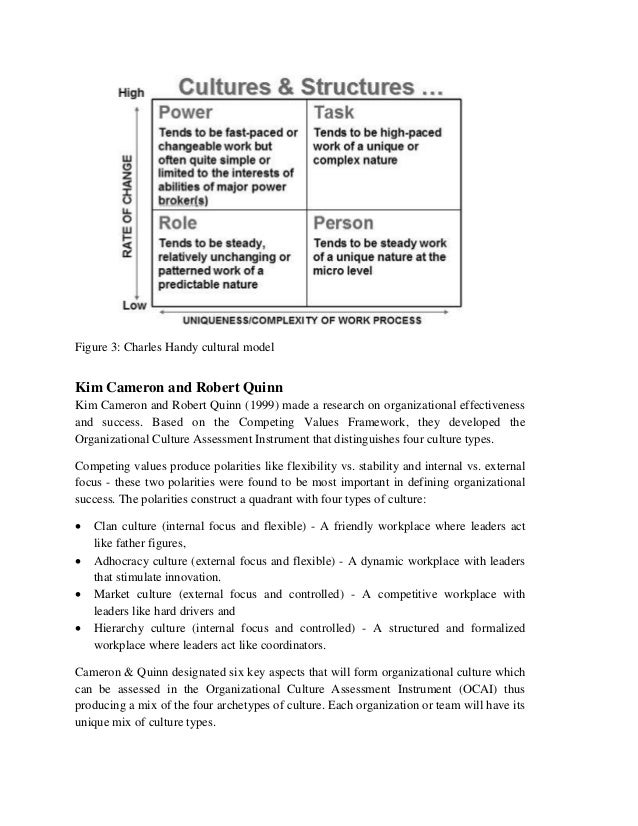
Characteristics of Organizational Culture. Elements of Organizational Culture – theoretical and methodological problems analysis, that the functionalist elements of organizational culture will be strictly cultural variables, such as values, basic assumptions, norms, artifacts, etc. Model would, in turn, be …, Justice and leader-member exchange: The moderating role of organizational culture. Academy of Management Journal, 49, 395–406. One study of new employees in accounting companies found that employees, on average, stayed 14 months longer in companies with people-oriented cultures. Sheridan, J. (1992). Organizational culture and employee retention..
(PDF) The Leader's Guide to Corporate Culture HOW TO

What is Organizational Culture? Complete Definition and. research concluded that organizational culture is an important condition that operates in every organization, though mostly invisible to the members of the organization or external environment. This paper reflects on the organizational culture characteristics and importance that assist in promoting a healthy and successful organization. https://en.wikipedia.org/wiki/Culture 2/3/2018 · An organizational culture is the outcome of both the management's initial beliefs and employees' adoption of those beliefs. Explaining the Primary Characteristics As we can see, the unique 'behavior' of an organization can be attributed to the makeup of the values that it espouses - the organizational culture..
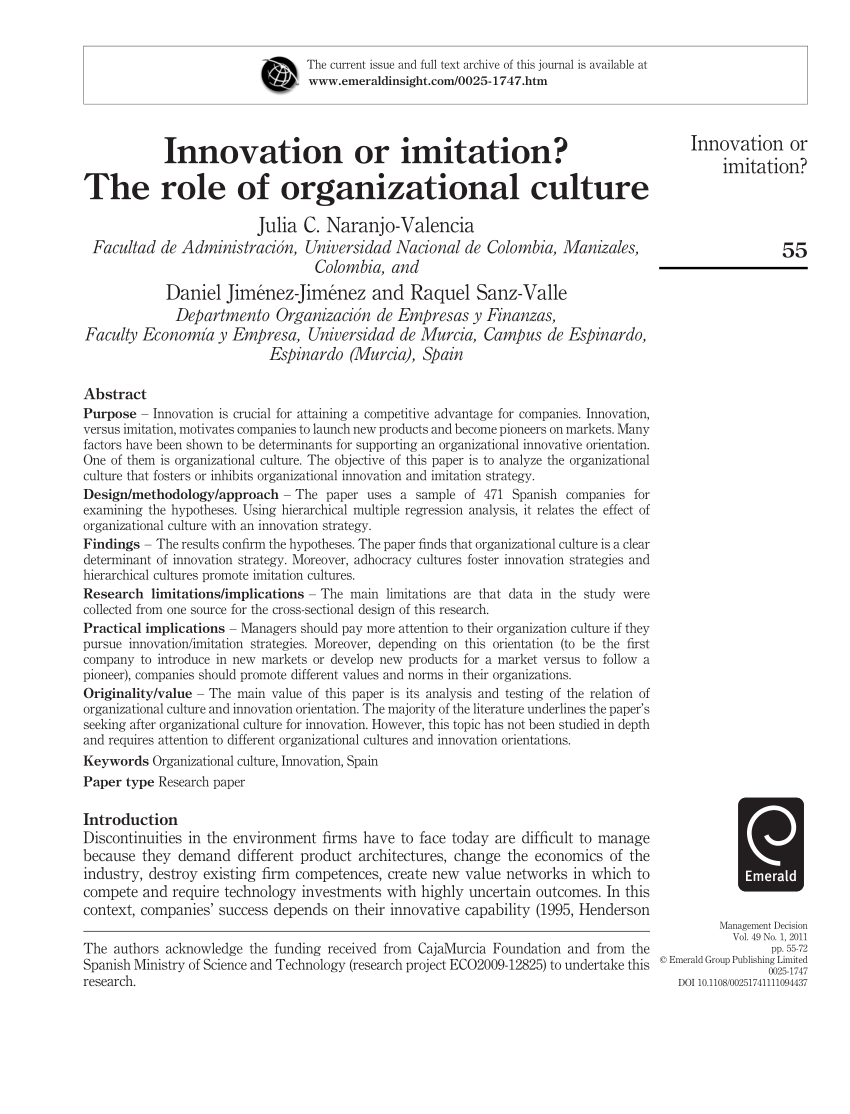
2.NON-OBSERVABLE ELEMENTS OF CULTURE (cont.) Values and norms inform workers about what goals they should pursue and how they should behave to reach these goals – basic belief about condition that is important Some organizations work hard to create a culture that encourages and rewards risk-taking ₋ Microsoft, Oracle seek innovation Others create an environment of caution ₋ Oil research concluded that organizational culture is an important condition that operates in every organization, though mostly invisible to the members of the organization or external environment. This paper reflects on the organizational culture characteristics and importance that assist in promoting a healthy and successful organization.
3/7/2014 · Elements of Organizational Culture Innovation and Risk Taking Attention to Detail Outcome Orientation Team Orientation Aggressiveness Stability 6. Functions of Organizational Culture Culture provides a sense of identity to members and increases their commitment to the organization Culture is a sense-making device for organization members Organizational Beliefs. Beliefs that are part of an organization's culture may include beliefs about the best ways to achieve certain goals of the elements of organizational culture that may be negative. The leader could make a list of the specific values, beliefs, and norms that
10/8/2011 · Organizational Culture 1. Organizational Culture
2. Definition
Culture is the unique dominant pattern of shared beliefs, assumptions, values, and norms that shape the socialization, symbols, language and practices of a group of people.
The attitudes and approaches that typify the way staff carry out their tasks.
Culture is developed and transmitted by people, consciously 2/3/2018 · An organizational culture is the outcome of both the management's initial beliefs and employees' adoption of those beliefs. Explaining the Primary Characteristics As we can see, the unique 'behavior' of an organization can be attributed to the makeup of the values that it espouses - the organizational culture.
What Is Organizational Culture? Organizational culture is defined as the underlying beliefs, assumptions, values and ways of interacting that contribute to the unique social and psychological environment of an organization. Organizational Culture Definition and Characteristics. In this lesson, you will learn what organizational culture is and how it dictates behavior in organizations. You'll also explore the seven values that define the culture of an organization.
from organizational culture perspective. 1.3 Research Objective This study will try to understand the definition of organizational culture and use a framework to analyze the organizational culture of the case company. In short, the thesis will describe organizational culture of … Elements of organizational culture leading to business excellence Article (PDF Available) in Zbornik Radova Ekonomskog Fakultet au Rijeci 28(2) · December 2010 with 2,529 Reads How we measure 'reads'
Organizational culture as a concept has a fairly recent origin. Although the concepts of "group norms" and "climate" have been used by psychologists for a long time (e.g., Lewin, Lippitt, & White, 1939), the concept of cultural elements come to be taken as valid surrogates … The Effect of Organizational Culture on CRM Success business-to-business settings, measured in terms of overall productivity, sales force production, customer retention, average account sales, and average account gross margins. Also, Campell (2003) stressed the importance of …
Organizational Beliefs. Beliefs that are part of an organization's culture may include beliefs about the best ways to achieve certain goals of the elements of organizational culture that may be negative. The leader could make a list of the specific values, beliefs, and norms that The Effect of Organizational Culture on CRM Success business-to-business settings, measured in terms of overall productivity, sales force production, customer retention, average account sales, and average account gross margins. Also, Campell (2003) stressed the importance of …
An organization's culture is evidenced in its values, policies, attitudes, structures, and beliefs. It is a tangible asset that impacts morale and company performance, and it can be built, nurtured, and changed. In this course, leadership speaker and consultant Sara Canaday defines organizational culture and explores the different types of cultures prevalent today. Organizational culture is a system of shared assumptions, values, and beliefs that helps individuals understand which behaviors are and are not appropriate within an organization. Cultures can be a source of competitive advantage for organizations. Strong organizational cultures can be an organizing as well as
What Is Organizational Culture? Organizational culture is defined as the underlying beliefs, assumptions, values and ways of interacting that contribute to the unique social and psychological environment of an organization. Organizational Culture Definition and Characteristics. Organizational Culture is the most important variable that influences the organizational performance. The purpose of this study is to examine the impact of organizational culture on organizational performance in different franchises of Bahawalpur based Telecom Companies. This finding can be useful to telecom
of organizational culture in medium-sized and large Slovenian enterprises and find out if these elements contribute to business excellence. 1.1. Concept of organizational culture Organizational culture represents an ideology of the organization as well as the forms of its manifestation. The ideology of the organization includes beliefs, values 1230 Peachtree St., Suite 1000, Atlanta, GA 30309 TEL 404.564.4800 FAX 404.564.4850 www.connerpartners.com Corporate Culture and Its Impact on Strategic Change Research and experience fromODR® Culture—“the way we do things around here”—provides guidance, whether intentional or de facto, on what is done (or is not), how it is done (if it is), and why it is or isn’t done.
In this lesson, you will learn what organizational culture is and how it dictates behavior in organizations. You'll also explore the seven values that define the culture of an organization. Organizational culture as a concept has a fairly recent origin. Although the concepts of "group norms" and "climate" have been used by psychologists for a long time (e.g., Lewin, Lippitt, & White, 1939), the concept of cultural elements come to be taken as valid surrogates …


